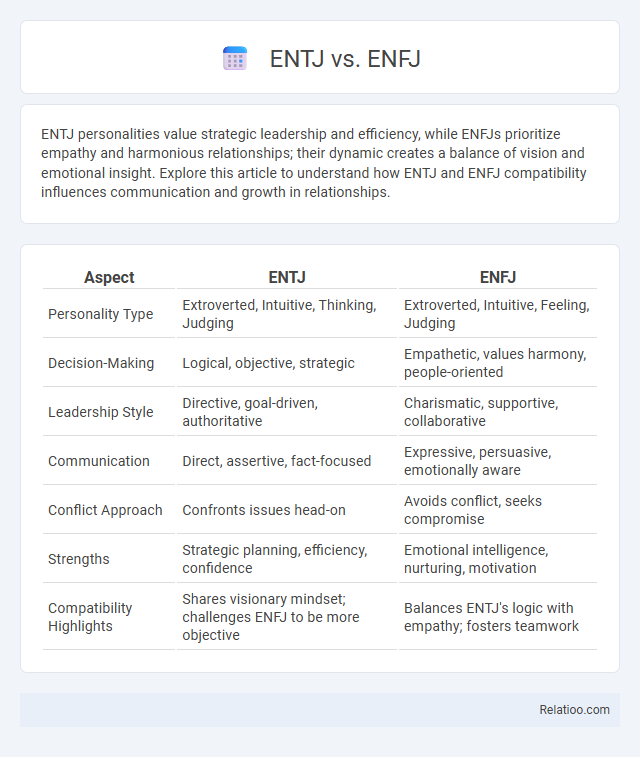ENTJ personalities value strategic leadership and efficiency, while ENFJs prioritize empathy and harmonious relationships; their dynamic creates a balance of vision and emotional insight. Explore this article to understand how ENTJ and ENFJ compatibility influences communication and growth in relationships.
Table of Comparison
| Aspect | ENTJ | ENFJ |
|---|---|---|
| Personality Type | Extroverted, Intuitive, Thinking, Judging | Extroverted, Intuitive, Feeling, Judging |
| Decision-Making | Logical, objective, strategic | Empathetic, values harmony, people-oriented |
| Leadership Style | Directive, goal-driven, authoritative | Charismatic, supportive, collaborative |
| Communication | Direct, assertive, fact-focused | Expressive, persuasive, emotionally aware |
| Conflict Approach | Confronts issues head-on | Avoids conflict, seeks compromise |
| Strengths | Strategic planning, efficiency, confidence | Emotional intelligence, nurturing, motivation |
| Compatibility Highlights | Shares visionary mindset; challenges ENFJ to be more objective | Balances ENTJ's logic with empathy; fosters teamwork |
Overview of ENTJ and ENFJ Personality Types
ENTJ and ENFJ personality types both excel in leadership and problem-solving, with ENTJs driven by strategic thinking and goal-oriented decision-making, while ENFJs emphasize empathy and interpersonal harmony. ENTJs rely on analytical skills and long-term vision to address complex problems efficiently, whereas ENFJs leverage emotional intelligence and collaboration to resolve conflicts and motivate teams. Understanding these differences enhances tailored approaches to problem-solving in diverse organizational environments.
Core Differences Between ENTJ and ENFJ
ENTJ and ENFJ personality types differ primarily in their decision-making processes and social focus, with ENTJs being strategic leaders who prioritize logical problem-solving and efficiency, while ENFJs emphasize empathy and interpersonal harmony in their approach. ENTJs excel in objective analysis and structured planning, leveraging extroverted thinking (Te) to tackle challenges methodically, whereas ENFJs use extroverted feeling (Fe) to understand others' emotions and foster collaboration. These core differences shape their problem-solving styles, with ENTJs focusing on results-driven solutions and ENFJs prioritizing relational dynamics and group consensus.
Leadership Styles: ENTJ vs ENFJ
ENTJ leaders excel in strategic decision-making and assertive problem-solving, using logic and efficiency to drive organizational goals, while ENFJ leaders prioritize empathy and interpersonal harmony, fostering collaboration and motivating teams through emotional intelligence. ENTJ leadership styles emphasize goal orientation, structured planning, and direct communication to overcome challenges, whereas ENFJs leverage their understanding of team dynamics and consensus-building to resolve conflicts and inspire collective action. Both personality types approach problem-solving differently: ENTJs focus on long-term solutions and objective analysis, while ENFJs integrate emotional insights and relational factors to create inclusive, people-centered outcomes.
Communication Patterns and Social Interaction
ENTJ personalities exhibit direct, assertive communication styles focused on efficiency and goal-oriented discussions, often leading in problem-solving scenarios by organizing tasks and driving decisions. ENFJs prioritize empathetic communication, fostering collaborative environments through active listening and emotional intelligence, which enhances social cohesion while addressing challenges. Both types excel in social interaction, but ENTJs emphasize strategic influence, whereas ENFJs focus on interpersonal harmony to resolve problems effectively.
Decision-Making: Logic vs Empathy
ENTJ personalities prioritize decision-making through logic, emphasizing objective analysis and strategic outcomes, while ENFJ individuals rely on empathy, considering the emotional impact on others and fostering harmony. Problem-solving for ENTJs involves systematic evaluation and efficiency, whereas ENFJs focus on collaborative solutions that address interpersonal dynamics. Balancing logic and empathy enhances decision quality, integrating rational judgment with emotional intelligence for effective leadership.
Career Preferences and Work Environments
ENTJ personalities thrive in strategic, leadership-driven careers such as executive management and entrepreneurship, preferring fast-paced, competitive environments that emphasize goal achievement and innovation. ENFJ types excel in people-oriented roles like counseling, education, and human resources, favoring collaborative, supportive work settings that prioritize interpersonal relationships and team development. Both personalities approach problem-solving with decisiveness and empathy respectively, ENTJs using analytical, logic-based methods and ENFJs applying intuition and emotional insight to resolve workplace challenges effectively.
Strengths and Challenges of ENTJ and ENFJ
ENTJ individuals excel in strategic problem-solving and decisive leadership, leveraging their natural confidence and goal-oriented mindset to overcome challenges efficiently, while ENFJ strengths lie in empathy and interpersonal skills, enabling them to solve problems by fostering collaboration and understanding. Your ability to recognize ENTJ's analytical rigor and ENFJ's emotional intelligence can enhance team dynamics and problem resolution effectiveness. However, ENTJs may struggle with patience and sensitivity, whereas ENFJs can face challenges in setting boundaries and managing conflict objectively.
Relationships and Emotional Intelligence
ENTJ personalities excel in strategic problem-solving with a focus on objective decision-making, often prioritizing efficiency over emotional considerations in relationships. ENFJ individuals demonstrate high emotional intelligence, using empathy and social awareness to navigate interpersonal dynamics and resolve conflicts effectively. Understanding the balance between ENTJ's task-oriented approach and ENFJ's people-centered strategies enhances collaborative problem-solving and strengthens relationship-building skills.
Conflict Resolution Approaches
ENTJ personalities approach conflict resolution with strategic, results-driven methods, prioritizing efficiency and logical analysis to achieve clear solutions. ENFJ individuals emphasize empathetic communication and collaboration, focusing on understanding emotions and fostering harmony within the group. Both types excel in problem-solving by leveraging their distinct leadership styles--ENTJs through decisive planning and ENFJs through social insight and cooperation.
Growth Areas for ENTJ and ENFJ
ENTJ personalities excel in strategic thinking and decisiveness but benefit from developing emotional intelligence and active listening skills to enhance team collaboration and conflict resolution. ENFJs demonstrate strong interpersonal abilities and empathy yet should focus on setting boundaries and managing stress to avoid burnout. Both types improve problem-solving effectiveness by balancing their natural leadership strengths with greater self-awareness and adaptability.

Infographic: ENTJ vs ENFJ
 relatioo.com
relatioo.com